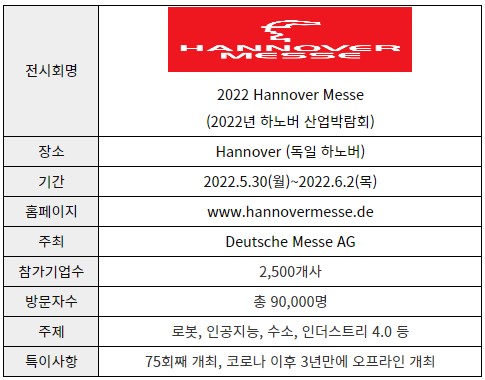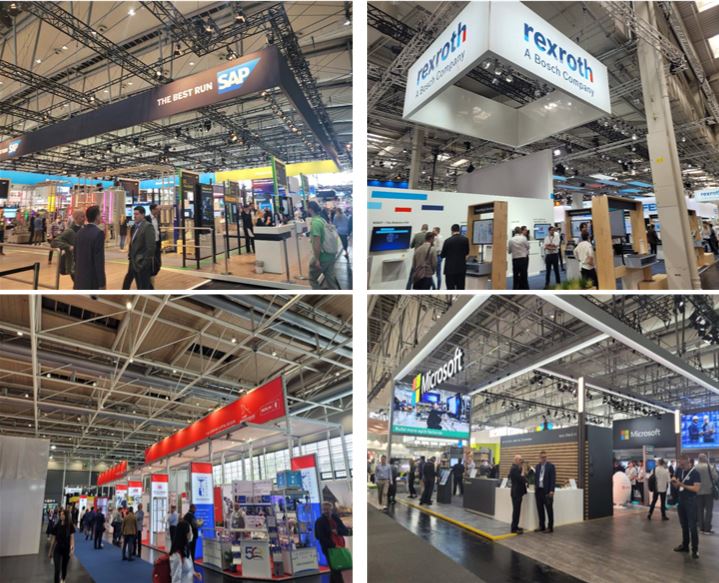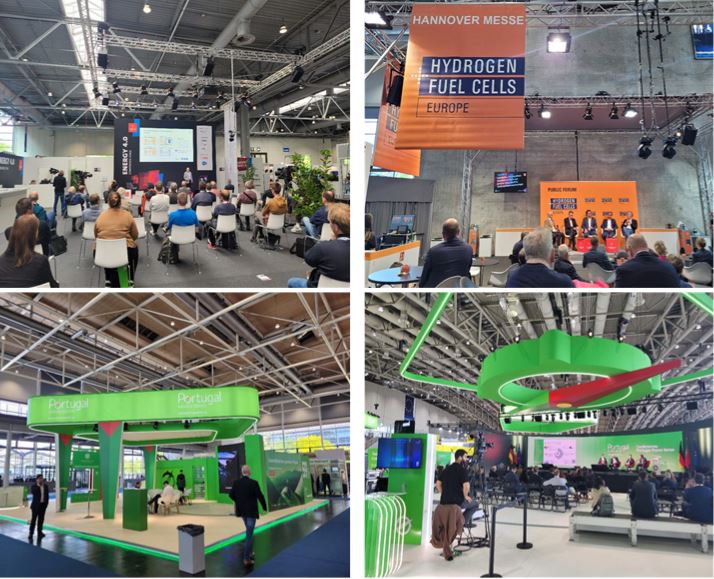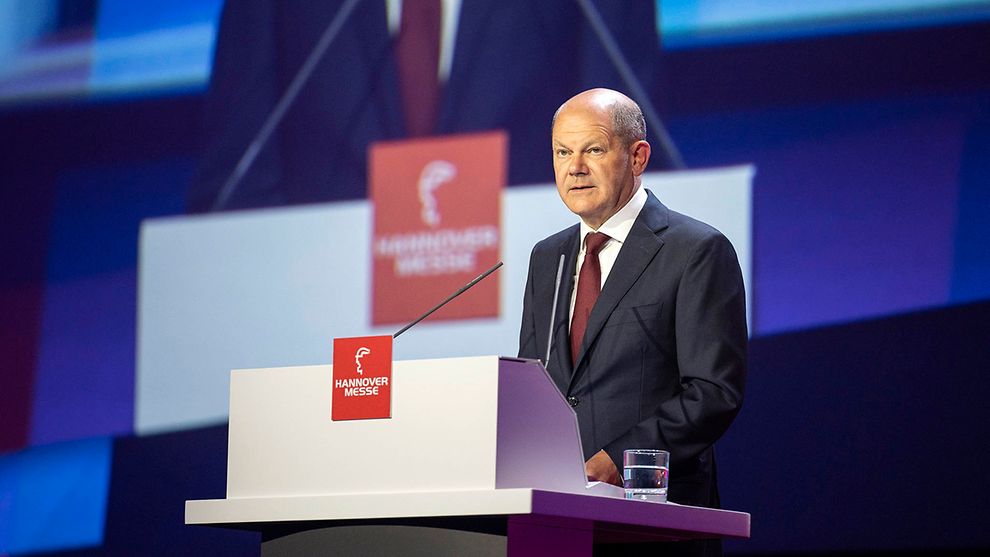– Hannover Industrial Fair held offline for the first time in 3 years since Corona
Exhibition Overview

[Source: Summary of the exhibition website]
About the exhibition
The Hannover Industrial Expo, the world's largest industrial technology exhibition and the birthplace of the 4th industrial revolution, was held for the 75th time this year. Due to the COVID-19 pandemic, 2020 was canceled and 2021 was held entirely online. This year, it was prepared in an on-offline hybrid format and was held at half the size of the existing exhibition, but it is meaningful in that an offline booth was prepared in three years.
According to the organizers, this year's exhibition was attended by 60 companies from 2,500 countries and exhibited about 8,000 products. German representative companies such as Siemens, SAP, and Bosch, as well as global companies such as Google and Microsoft, set up their own booths. A total of 29 Korean companies participated, including 40 companies participating in the Korean Pavilion.
In addition, about 75,000 visitors directly visited the offline booth alone for four days, and 15,000 people participated in the online booth, bringing a total of 90,000 visitors to the Hanover Messe, the organizers said.
<View of the Hannover Industrial Fair Exhibition Hall>

[Source: Self-photographed at the Trade Center]
Hannover Industrial Fair is an exhibition that the German government announced 'Industry 2011' to strengthen manufacturing competitiveness in 4.0, and it is a representative exhibition that attracts the attention of related industries around the world. There are many evaluations that it has become the foundation of the 4th industrial revolution by promoting the emergence of new technologies such as smart factories and the Internet of Things, including policies to build a complete automation system in the manufacturing industry and increase the efficiency of the production process. In line with this reputation, a large-scale exhibition booth was created to show off related technology in a total of 11 halls in this exhibition.
It was easy to see conferences and seminars held in various places in the exhibition hall. As if each hall was divided by subject, experts in each field, such as hydrogen, energy, and robotics, stood on the podium and held conferences and seminars. The themes were different for each time zone, and basically lasted about 1 to 2 hours. It was easy to see the visitors passing by the booth and participating in the seminar, freely asking and answering questions.
Portugal's participation as a partner country this year also drew attention. The Hannover Industrial Expo annually designates a partner country and prepares a separate large-scale exhibition booth. If selected as a partner country, the two countries will be given the opportunity to promote summit meetings and more actively promote exhibition benefits and participating companies. In particular, it is popular in many countries in that it can see the trends of the 4th industrial technology at a glance and expand the scale of trade with Germany, a manufacturing powerhouse. Korea also participated in 2009.
<View of the Hannover Industrial Fair Exhibition Hall>

[Source: Self-photographed at the Trade Center]
In addition, Italy participated as a representative at the Chamber of Commerce and Industry, and Korea, the United States, Austria, Israel, the Netherlands, and China also organized a group pavilion and participated.
Exhibition Trends
This year's Hannover Industrial Expo has a major theme of 'Industry Transformation' and 'Digitalization and Sustainability' as the main theme. ① Artificial Intelligence and Machine Learning ② Decarbonization ③ Hydrogen and Fuel Cell ④ Industry 4.0 ⑤ Cyber Security ⑥ Logistics 4.0 ⑦ Digital Platform A total of seven industry trends were presented.
In particular, German Chancellor Olaf Scholz, who gave a keynote speech at this exhibition, emphasized eco-friendly technologies such as carbon neutrality. Chancellor Scholz said, "By 2030, 80% of Germany's energy needs will be supplied by renewable energy." The plan is to promote the development of 'manufacturing innovation' and 'green energy technology' by significantly improving the certification system for products. In addition, he announced tax benefits and support measures for R&D in high-tech fields such as machinery, electricity and electronics.
<Keynote Speech by German Chancellor Olaf Scholz>

[Source: German Federal Government website]
Germany's Minister of Economics and Climate Protection Robert Havek also said, "By looking at the technologies exhibited at this exhibition, we were able to confirm the environmental problems that the world is facing now." , will be able to find the answer to realize eco-friendliness.”
Johann Kökler, director of the Hanover Exhibition Authority in Germany, said, “Despite the corona pandemic, we are delighted to reopen an exhibition where people can communicate face-to-face. The exhibition was successfully held thanks to visitors from various fields, including industry and academia.”
Director Kökler also said, “New technologies and digitalization trends introduced through Hannover Messe have provided solutions to the problems facing the world today.”
As such, in the actual exhibition, various eco-friendly technologies could be seen under the theme of green technology. German business software company SAP introduced services such as carbon footprint calculation, circular economy support, and ESG (environmental, social and governance) management support. German manufacturer Bosch, which announced that it had already achieved carbon neutrality last year, unveiled energy saving technology and green energy power generation technology. Green hydrogen production technology such as water electrolysis technology, which is the core of renewable energy storage technology, and next-generation engine, an eco-friendly power engine that uses hydrogen energy instead of oil, were exhibited.
In addition, we were able to see examples of automation applied with AI technology, which is the core of digital transformation. Festo, a German manufacturing automation company, exhibited a precision monitoring system for factory facilities using flying drones. It drew attention as a technology that allows users to view images captured by drones flying between very cramped factory facilities through a smartphone through 5G communication.
In an interview, a sales representative of R company that actually participated in the Korea Pavilion said, “Technologies such as drones and robots are expanding the scope of application from the general manufacturing industry to various fields. could be,” he said.
<View of the Hannover Industrial Fair Exhibition Hall>

[Source: Self-photographed at the Trade Center]
Regarding the Hannover Industrial Fair, German economic magazine Handelsblatt said, “In the current world where the global economy is rapidly changing, climate change and resource scarcity are intensifying, and prices are soaring, technology is emerging as a solution, not a cause, of a problem.” “Hanover The industrial fair showed that it is possible to solve the demands of the times that the world is facing.”
implication
The Hannover Industrial Expo, which is called the birthplace of the 4th industrial revolution, is an exhibition where you can see global technology trends at a glance. Also, as it was held offline for the first time in three years, the first and second days of the exhibition were crowded with cloud crowds.
In particular, eco-friendliness such as decarbonization, energy saving, and climate change were key keywords in this exhibition. In all 11 halls, eco-friendly technologies and companies were resident, and it was easy to see related seminars and conferences in each hall.
In fact, Germany aims to achieve carbon neutrality by 2045. It is five years less than the 'Fit for 2050' goal of achieving carbon neutrality by 55 at the EU level (reducing carbon emissions by 2030% compared to 1990 levels by 55). In addition, automobile carbon emission regulations are being strengthened. The EU recently passed a revised carbon dioxide emission performance standard that effectively bans the sale of new vehicles with internal combustion engines from 5. The analysis of the local media is that Germany, the leader in the introduction of eco-friendly policies, is highly likely to go ahead.
As such, the Hannover Industrial Expo raised the alarm that the domestic industry needs more interest in eco-friendly technologies. It also showed that 4th industrial technologies such as smart factory, artificial intelligence, and AI can not only improve efficiency in business operation, but also provide future food businesses. This is the reason why more attention should be paid to the Hannover Industrial Expo and related industry and technology trends, which can be expected to have both eco-friendliness and economic ripple effects, now that ESG management has emerged as a trend.



